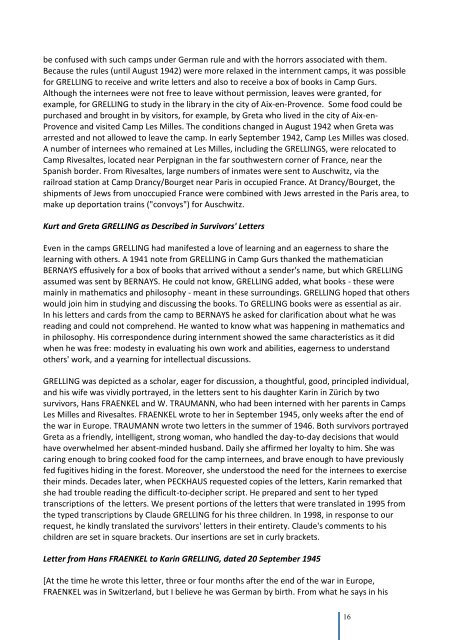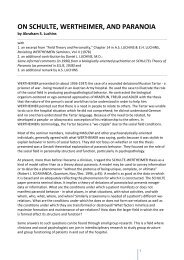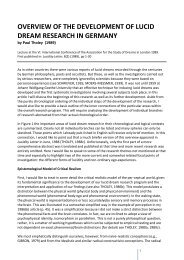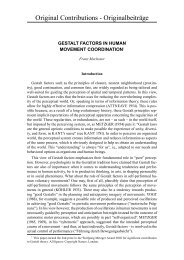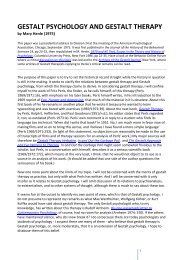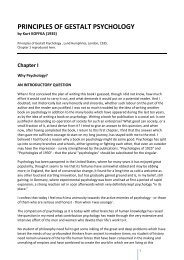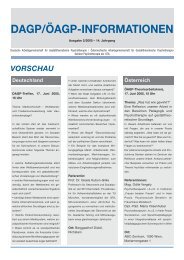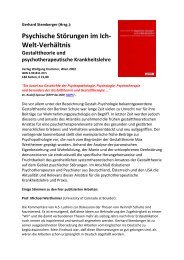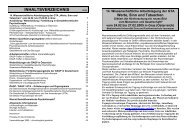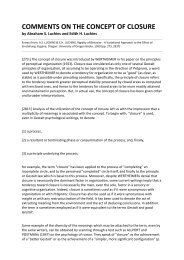pdf-Download - Society for Gestalt Theory and its Applications (GTA)
pdf-Download - Society for Gestalt Theory and its Applications (GTA)
pdf-Download - Society for Gestalt Theory and its Applications (GTA)
You also want an ePaper? Increase the reach of your titles
YUMPU automatically turns print PDFs into web optimized ePapers that Google loves.
e confused with such camps under German rule <strong>and</strong> with the horrors associated with them.<br />
Because the rules (until August 1942) were more relaxed in the internment camps, it was possible<br />
<strong>for</strong> GRELLING to receive <strong>and</strong> write letters <strong>and</strong> also to receive a box of books in Camp Gurs.<br />
Although the internees were not free to leave without permission, leaves were granted, <strong>for</strong><br />
example, <strong>for</strong> GRELLING to study in the library in the city of Aix-en-Provence. Some food could be<br />
purchased <strong>and</strong> brought in by visitors, <strong>for</strong> example, by Greta who lived in the city of Aix-en-<br />
Provence <strong>and</strong> visited Camp Les Milles. The conditions changed in August 1942 when Greta was<br />
arrested <strong>and</strong> not allowed to leave the camp. In early September 1942, Camp Les Milles was closed.<br />
A number of internees who remained at Les Milles, including the GRELLINGS, were relocated to<br />
Camp Rivesaltes, located near Perpignan in the far southwestern corner of France, near the<br />
Spanish border. From Rivesaltes, large numbers of inmates were sent to Auschwitz, via the<br />
railroad station at Camp Drancy/Bourget near Paris in occupied France. At Drancy/Bourget, the<br />
shipments of Jews from unoccupied France were combined with Jews arrested in the Paris area, to<br />
make up deportation trains ("convoys") <strong>for</strong> Auschwitz.<br />
Kurt <strong>and</strong> Greta GRELLING as Described in Survivors' Letters<br />
Even in the camps GRELLING had manifested a love of learning <strong>and</strong> an eagerness to share the<br />
learning with others. A 1941 note from GRELLING in Camp Gurs thanked the mathematician<br />
BERNAYS effusively <strong>for</strong> a box of books that arrived without a sender's name, but which GRELLING<br />
assumed was sent by BERNAYS. He could not know, GRELLING added, what books - these were<br />
mainly in mathematics <strong>and</strong> philosophy - meant in these surroundings. GRELLING hoped that others<br />
would join him in studying <strong>and</strong> discussing the books. To GRELLING books were as essential as air.<br />
In his letters <strong>and</strong> cards from the camp to BERNAYS he asked <strong>for</strong> clarification about what he was<br />
reading <strong>and</strong> could not comprehend. He wanted to know what was happening in mathematics <strong>and</strong><br />
in philosophy. His correspondence during internment showed the same characteristics as it did<br />
when he was free: modesty in evaluating his own work <strong>and</strong> abilities, eagerness to underst<strong>and</strong><br />
others' work, <strong>and</strong> a yearning <strong>for</strong> intellectual discussions.<br />
GRELLING was depicted as a scholar, eager <strong>for</strong> discussion, a thoughtful, good, principled individual,<br />
<strong>and</strong> his wife was vividly portrayed, in the letters sent to his daughter Karin in Zürich by two<br />
survivors, Hans FRAENKEL <strong>and</strong> W. TRAUMANN, who had been interned with her parents in Camps<br />
Les Milles <strong>and</strong> Rivesaltes. FRAENKEL wrote to her in September 1945, only weeks after the end of<br />
the war in Europe. TRAUMANN wrote two letters in the summer of 1946. Both survivors portrayed<br />
Greta as a friendly, intelligent, strong woman, who h<strong>and</strong>led the day-to-day decisions that would<br />
have overwhelmed her absent-minded husb<strong>and</strong>. Daily she affirmed her loyalty to him. She was<br />
caring enough to bring cooked food <strong>for</strong> the camp internees, <strong>and</strong> brave enough to have previously<br />
fed fugitives hiding in the <strong>for</strong>est. Moreover, she understood the need <strong>for</strong> the internees to exercise<br />
their minds. Decades later, when PECKHAUS requested copies of the letters, Karin remarked that<br />
she had trouble reading the difficult-to-decipher script. He prepared <strong>and</strong> sent to her typed<br />
transcriptions of the letters. We present portions of the letters that were translated in 1995 from<br />
the typed transcriptions by Claude GRELLING <strong>for</strong> his three children. In 1998, in response to our<br />
request, he kindly translated the survivors' letters in their entirety. Claude's comments to his<br />
children are set in square brackets. Our insertions are set in curly brackets.<br />
Letter from Hans FRAENKEL to Karin GRELLING, dated 20 September 1945<br />
[At the time he wrote this letter, three or four months after the end of the war in Europe,<br />
FRAENKEL was in Switzerl<strong>and</strong>, but I believe he was German by birth. From what he says in his<br />
16


